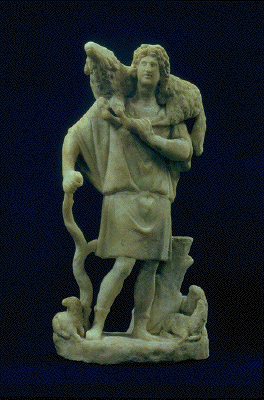Fourth Sunday of Easter, C
You can discuss one or more of these teachings of the church today. Use your powers of discernment to make your choice based on three criteria:
- What have the catechumens been asking about?
- What issues came up during the dismissal reflections?
- What, in your opinion, needs clarification for the catechumens?
- The Holy Trinity
- Apostolic mission of the church
- Salvation of all creation
Acts 13:14, 43-52
Revelation 7:9, 14-17
John 10:27-30
Catechist Wisdom
Strengthen your wisdom powers by reflecting on the readings yourself before the catechetical session.
Through the story of Paul and Barnabas, the first reading highlights the church’s universal mission to preach the Good News of salvation to all the world. The “Gentiles” are a metaphor for all those in the world whom God loves. We, as members of the church, take the energy, passion, and courage of Paul and Barnabas as our inspiration.
The second reading gives us a vision of the “destination” of our salvation. The goal of salvation is complete love and unity, with no divisions, among all the nations and races of people and with God in heaven. This is a reflection of the unity of the Holy Trinity.
The gospel reminds us that it is the love of Christ that is the source and cause of our salvation. It is an intimate love, a love that is shared between Christ and the Father. The dynamism of their love is a creative Spirit, so real and powerful that it makes them (and us) one.
Teaching Powers
Based on your discernment of the core belief(s) to emphasize today, connect one or more of these church teachings with what the catechumens experienced in the liturgy and what they have experienced in their daily lives this past week. Ask the sponsors to help the catechumens make these connections during the discussion.
-
- The mystery of the Trinity is the core belief of all our beliefs. It is foundational to all the rest of what we believe. Like the mystery of love, we can never fully understand it. However, with God’s help, we will grow to know more and more about the Holy Trinity.
- One of the ways we grow to understand the Trinity is through Jesus’ incarnation. Jesus reveals God to us, and we realize he is one with the Father.
- We also know that through Jesus’ death and resurrection, the Holy Spirit was poured out upon the church. The mission of the Holy Spirit is exactly the same as Jesus’ mission. That understanding reveals to us that the Holy Spirit is one with the Father and the Son. “With the Father and the Son he is worshipped and glorified” (Nicene Creed).
- We believe that the Holy Spirit proceeds from both the Father and the Son. This was a very important controversy in the fourth century church. It simply means that the Holy Spirit is equally the Spirit of the Father and the Spirit of the Son.
- We also learn more deeply about the Holy Trinity because, through the grace of baptism, we are drawn into the dynamic life of the Trinity. We learn about the Trinity “up close and personal.” We are baptized “in the name of the Father and of the Son and of the Holy Spirit.”
- We do not believe in three Gods. This is important. We believe in only one God. And we believe that God is three separate persons, all equal in glory. It can be confusing to think about, but remember this is not about physical science. It is about an absolute unity of love.
- Because God is an absolute unity of love, all of God’s actions are also one. We cannot assign different jobs to different persons as though the other persons are not involved. The Catechism says it this way: “Within the single divine operation each shows forth what is proper to him in the Trinity, especially in the divine missions of the Son’s Incarnation and the gift of the Holy Spirit” (267).
- The church is one Body. We become part the church and part of the one Body through baptism. In baptism, we are given new life by the one Spirit for one purpose: to bring hope to the world.
- The life given to the church by the Spirit through baptism makes the church holy. The fact that we are still sinners and yet made holy is what gives the world hope.
- The holiness we have and the hope we offer is universal. It is for everyone. That’s what “catholic” means. We are sent to the whole world, even our enemies, even sinners greater than ourselves, to offer the one hope.
- This universal sending, and the work we do to proclaim the message of hope, is what we mean when we say the church is apostolic. We follow the example of the apostles and we continue the work of the apostles. We do this under the leadership of the Pope and the bishops who are the successors of the apostles.
- God is the source of all creation and has a plan for creation. Creation itself is a witness to God’s love for us. Through the death and resurrection of Christ, God effects the salvation of everything in the cosmos.
- The salvation of Creation through Christ is so transformative that it is a glorious new creation. Christ restores Creation to it’s original holiness before sin entered the world.
The Holy Trinity
(see CCC 261-267)
Apostolic mission of the church
(see CCC 866-870)
Salvation of all creation
(see CCC 315, 374, 384)
Click here to see the correlations with protocols from the Office of the Catechism
Saving the World
Ask the catechumens to reflect back what they heard today. Ask them to name one or two practical ways they will put their new learning into practice in the coming week.


















